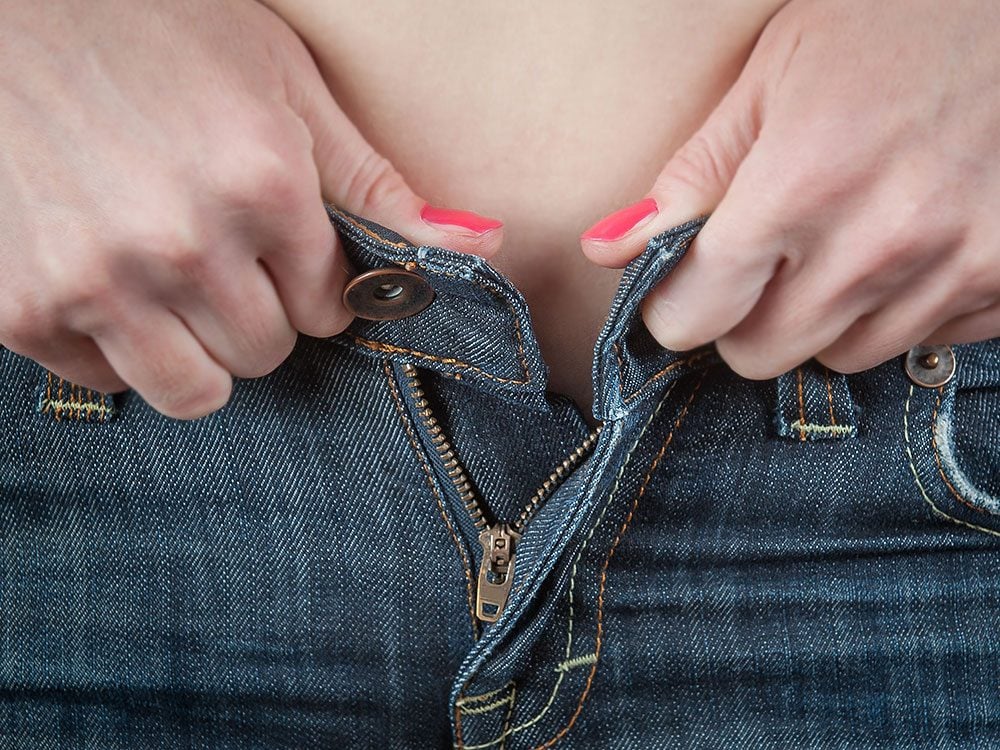
Avoid the obvious problems
Everyone knows that if you’re a drive-through regular and routinely polish off pints of ice cream you’re going to gain weight, but that’s not you. In fact, you rarely eat fried foods, and when you do eat dessert you limit yourself to a sensible portion. So why are your pants suddenly getting tighter?
The reasons why the pounds are piling on aren’t always quite as obvious as you might expect them to be. Here are 50 sneaky things you might not have considered that could be making you gain weight.
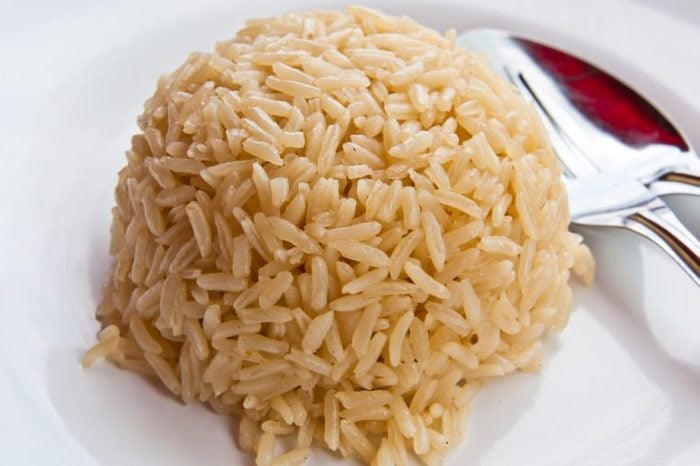
Whole grains cover your whole plate
Sure, they’re healthy—especially compared to refined grains. But you can have way too much of a good thing. “The 2015 Dietary Guidelines for Americans recommend you make half your grains whole, so ingredients such as whole wheat pasta, brown rice, and quinoa can all be part of meeting these recommendations. But these whole grains also contain a hefty number of calories if you eat too much,” says Toby Amidor, RDN, author of The Easy 5-Ingredient Healthy Cookbook. Two cups of cooked whole-wheat pasta, for instance, adds up to 400 calories. Try to limit yourself to a 1-cup serving (same goes for brown rice, quinoa, farro, and barley) and round out your meal with plenty of veggies and some lean protein. By the way, here are 50 ways to lose weight without a lick of exercise.
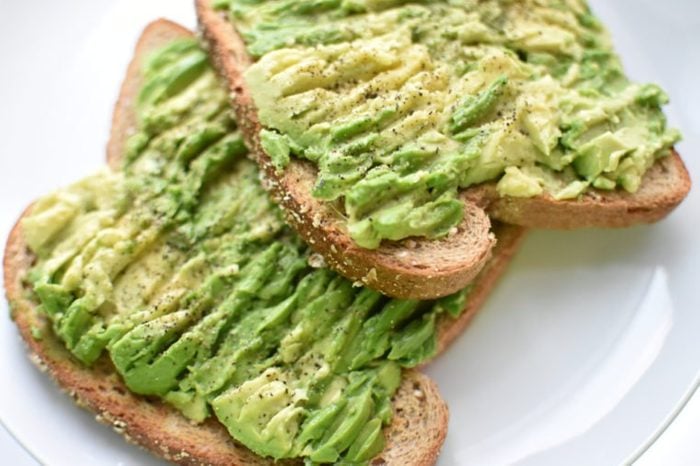
You’re obsessed with avocado toast
Again, it’s about the quantity, and it’s easy to overdo it. “Avocados contain a healthy dose of nutrients and heart-healthy unsaturated fat, but eating an entire avocado or using half an avocado daily for your avo toast can rack up hundreds of calories rather quickly,” says Amidor. “An entire avocado contains 322 calories and close to 30 grams of fat—that’s 45 per cent of the daily recommended amount of total fat!” About a fifth of an avocado is the right amount for a healthy snack. Check out 30 more painless ways to cut 100 calories.
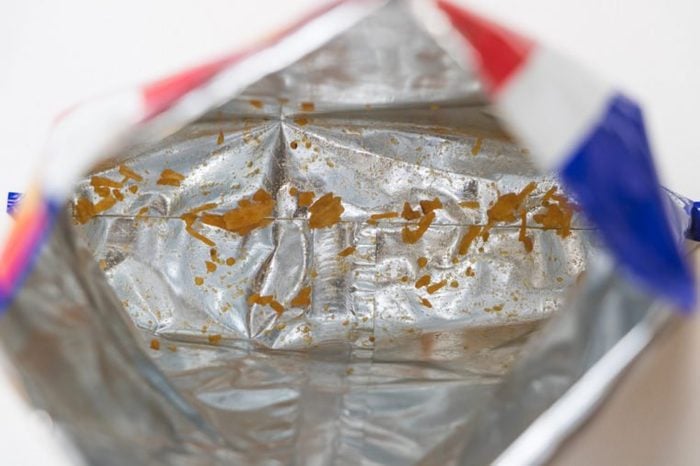
You trust in the broken cookie rule
Wouldn’t it be nice if those cookie crumbs at the bottom of the bag and the fries you swiped from a friend’s plate didn’t contribute to your calorie count for the day? Sadly, those nibbles add up. “It’s easy to get 100 calories—or more!—from little bites each day, which could cause you to gain roughly a pound a month without realizing where the extra calories are coming from,” says Tammy Lakatos Shames, RDN, CDN, CFT, co-founder of NutritionTwins.com. Try keeping a food diary for a few days and write down everything you put in your mouth; the tally might surprise you.
This is the absolute best diet for weight loss (and no, it’s not Keto)!
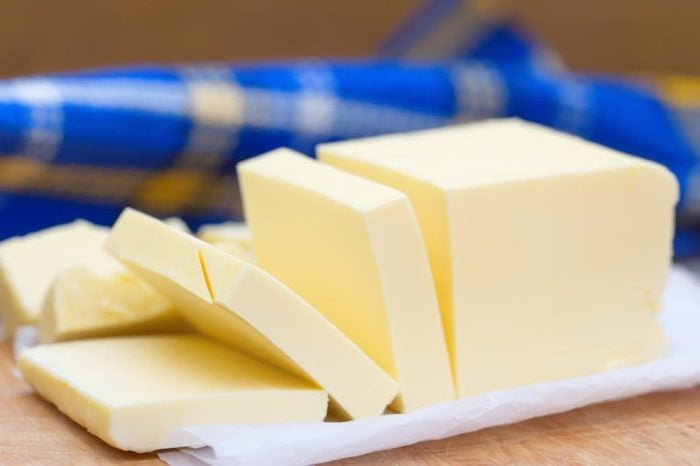
You tell your waiter to “go light” on the butter
You get an “A” for effort, but “light” probably doesn’t mean the same to you as it does to most professional chefs. If they’re following instructions they will scale back a bit, but they’re probably still going to slather on way more butter—or mayo or aioli or other high-calorie ingredients—than you would if you were preparing a meal at home, says Lakatos Shames. “Instead, request the condiments/sauces/butter/oil on the side and use them sparingly, if at all.”
These nine simple changes helped fitness blogger Katie Dunlop lose 45 pounds—and keep it off!
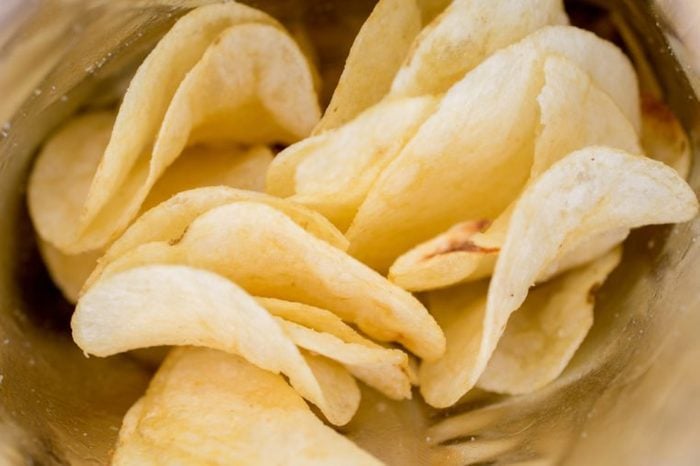
You eat straight from the bag
You take just one small handful of chips… and then another, and maybe another. How much are you really eating in total? “It’s easy to go back for more and assume you just had a serving,” especially when eating out of a “family size” bag, says Lakatos Shames. (The bigger the bag, the more people tend to eat.) Next time, take a minute to grab a small bowl and measure out a reasonable portion first.
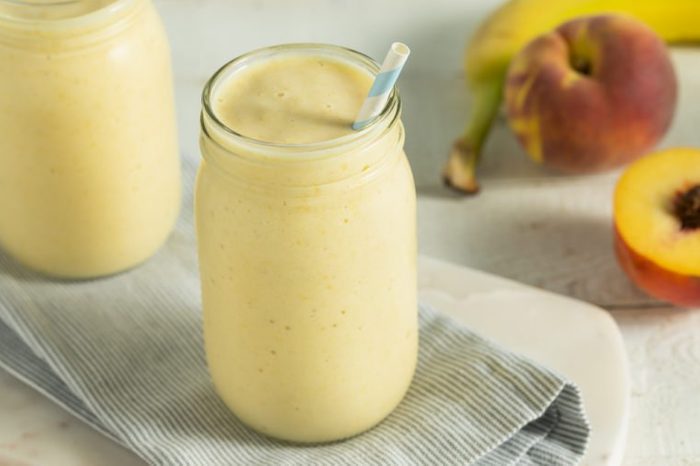
You go bananas for sweet smoothies
“Juice-based drinks and smoothies often contribute a lot of calories,” says Ginger Hultin, RDN, a spokesperson for the Academy of Nutrition and Dietetics. “They can spike blood sugar quickly, which causes it to drop back down and makes you ‘crash’ once insulin responds. Once blood sugar is down again, the body starts craving more sugar—and that’s what fruit juice and fruit smoothies are, really.”
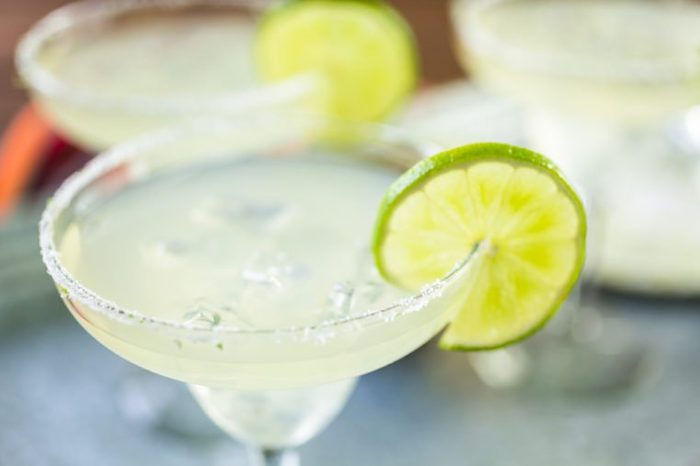
You like to unwind with an adult beverage
You probably know that margaritas, daiquiris, and other calorie-laden mixed drinks can make you gain weight, “but even having low-calorie beer and wine can add up quickly and cause weight gain,” says Hultin. “Some people have a hard time with weight loss if they’re drinking much at all.” Here are 10 tricks to help curb your drinking.
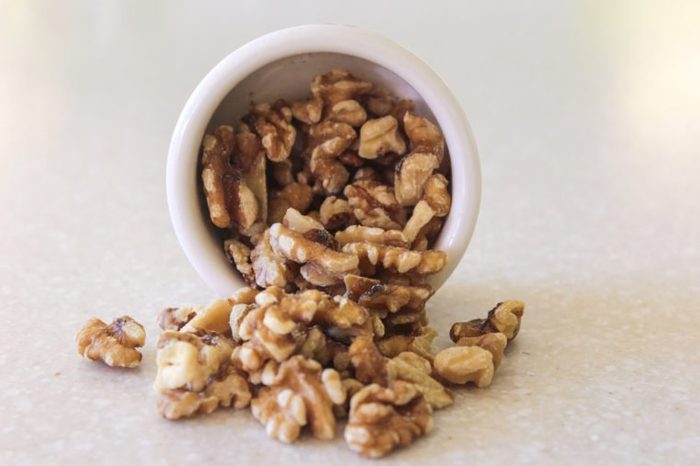
You’re nuts for nuts
Nuts have a healthy reputation, which is mostly deserved. “They’re packed with vitamins, minerals, antioxidants, fibre, protein, and healthy fats,” says Hultin. The catch is that the serving size is probably much smaller than you realize. “For example, 14 shelled walnut halves and 24 shelled almonds equal one serving,” she notes. Be sure to count them out (or buy prepackaged 100 calorie packs) instead of eating by the handful.
Here are 30 healthy snacks no adult has to feel guilty about eating!
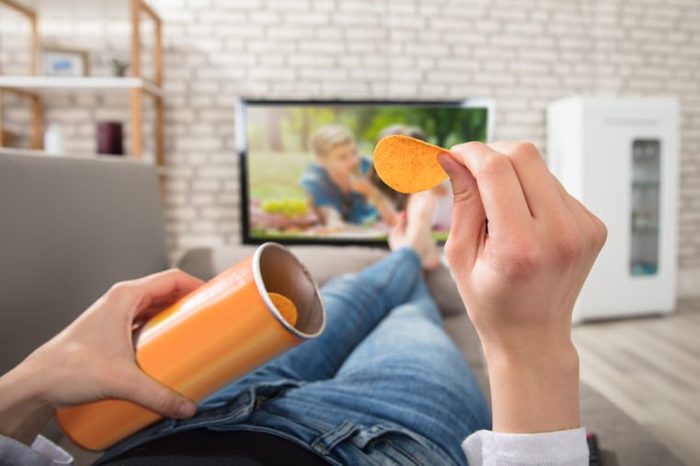
You don’t focus on your food
Whether you’re at a cocktail party, sitting in front of your computer, or binge-watching a show on Hulu, food isn’t your focus—yet you’re still eating. And eating. And eating. “When we’re not being mindful or paying attention, it’s easy to eat more than we want—or need—to be eating” and gain weight, says South Florida sports nutritionist Barbara Lewin, RDN. Try eating more slowly and mindfully and you’ll naturally eat less.
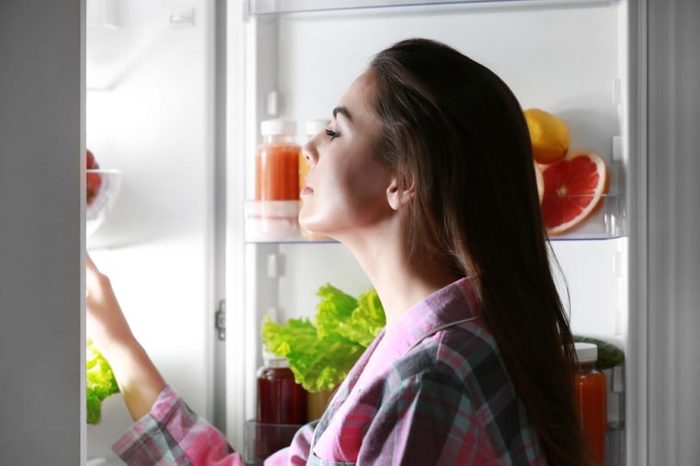
You fail to plan
It’s 6 p.m. You’re hungry. What’s in your fridge? If the answer is nothing but ketchup packets and expired yogurt, it’s only a matter of minutes before you call for takeout. “It’s important to create an environment for success,” says Marisa Moore, MBA, RDN. “Stock the fridge and pantry with the foods you like that are healthy and keep you feeling full and satisfied.” (Psst—these are the 12 groceries that are worth buying organic.)

You’re so, so tired
“Not sleeping enough can certainly contribute to weight gain, because it can make you crave high carbohydrate/high fat comfort-type foods,” says Elisa Zied, CDN, author of Younger Next Week. While research has shown that sleep deprivation can mess with your hunger hormones throughout the day, you may be especially vulnerable late at night when you’re less active and trying to de-stress and unwind, she adds. Learn about the nighttime habits that can help you lose weight in your sleep.
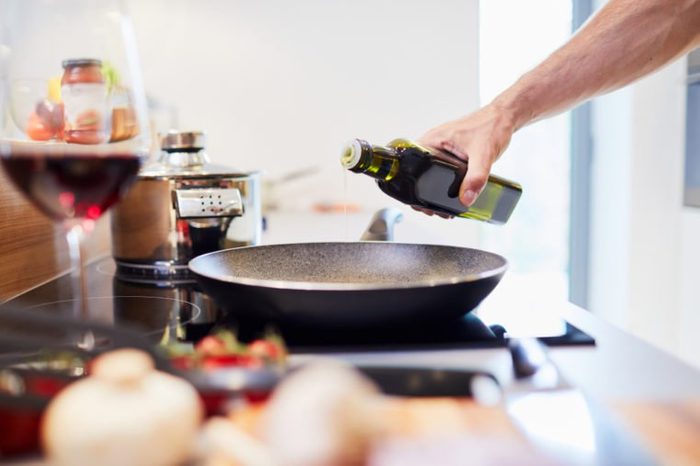
You OD on oil
Sautéing your own fish and veggies? Great! Pouring carelessly from a big bottle of oil? Not so much. “We use way more oil when cooking than we think, and every tablespoon adds 120 calories,” says Joy Bauer, RDN, host of NBC’s new show, “Health + Happiness,” and the nutrition expert for the TODAY Show. “Instead of pouring freehand from the bottle when sauteing, roasting, or grilling, try an oil mister—you’ll use far less. Store-bought spray canisters are super convenient, but you can also make your own more Earth-friendly version by purchasing a mister at a home-goods store and refilling it with a heart-healthy oil like olive or canola.”

You live in a smoggy city
It’s not only bad for your lungs; the congestion could also be making you gain weight. Believe it or not, a number of studies have tied pollution to a higher risk of obesity. While some of these studies have been limited to animals, such as rats, a 2016 analysis published in Obesity Reviews suggests that the connection extends to people. More research is needed, but exposure to a variety of chemicals that impact the endocrine system may be to blame. If you can’t move, you may at least want to consider investing in an air purifier.

You’ve messed up your taste buds
We all have different preferences, but research shows that when you start to overeat certain foods and gain weight your taste buds can become a bit duller. The result: Flavours like sweet and salty don’t taste as intense, so you may require more sugar and salt to get the taste you crave. Try scaling back slowly—one fewer sugar packet in your coffee—or simply wait it out; your taste buds will acclimate over time.
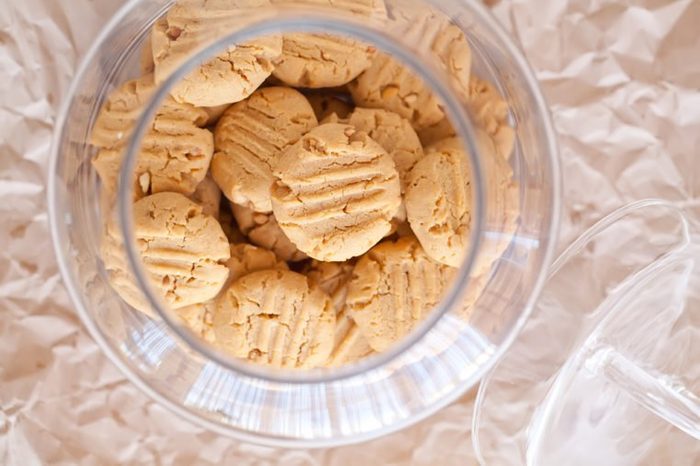
You indulge in fat-free cookies, bars, and other diet goodies
Nothing’s really for free, is it? Fat-free treats are usually packed with extra sugar, which can make the calorie count soar (and you gain weight), says Sonya Angelone, RDN, a spokesperson for the Academy of Nutrition and Dietetics. You might be better off with a small portion of the real stuff.
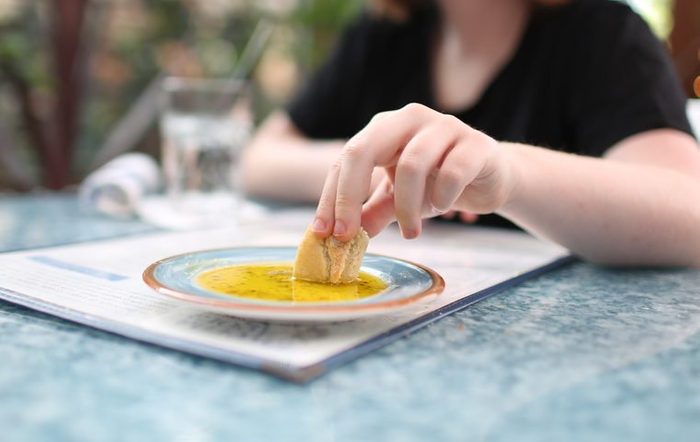
You dip bread in olive oil instead of spreading on butter
“Oil is higher in calories than butter, and it gets soaked up by the bread quickly,” says Angelone. The health halo is a factor, too. “People usually eat more calories from oil than from butter because ‘it’s healthier.'”
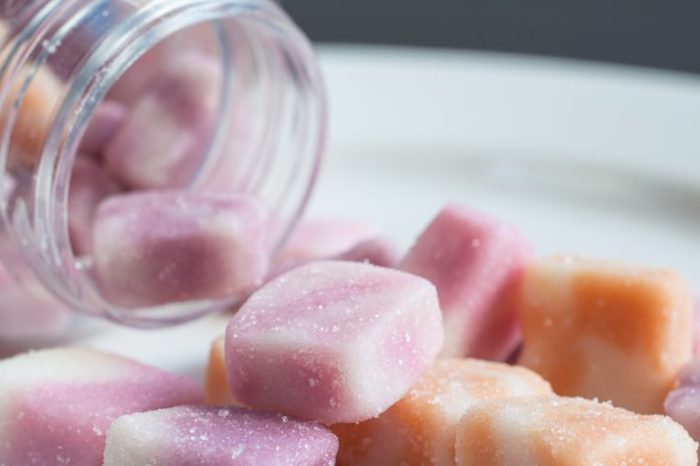
You’ve switched to gummy vitamins
It’s true that they don’t have a lot of calories, but they have more than plain old-fashioned pills. “They’re full of sugar calories, especially if you eat a few too many. That can add weight slowly but surely,” says Angelone.
Losing weight too slowly for your liking? Here are four surprising ways to speed-up your slim-down!
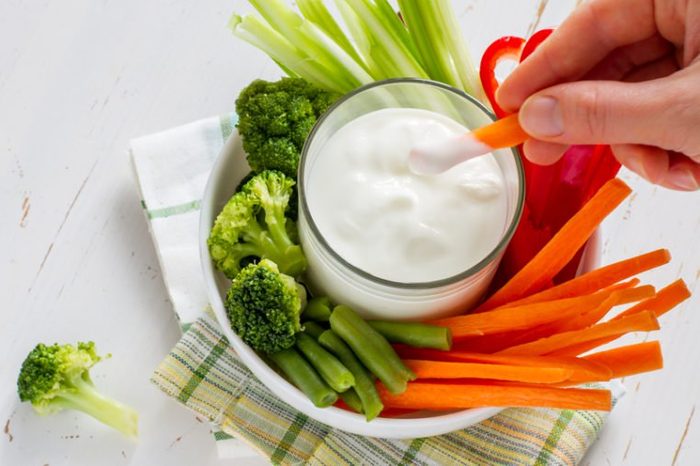
You dip raw veggies in ranch
Veggies are great. The ranch dressing, however, has a lot of calories from fat, and it’s so easy to keep dipping and dipping, says Angelone. Measure out a small serving of dressing or switch to a lighter topping, like hummus (which also packs some protein and fibre).
Check out these 30 proven weight loss tips inspired by TV’s The Biggest Loser!

You finish your kids’ leftovers
“These are considered seconds!” says Angelone. Or, if you have a full house, thirds, fourths, and so on. Those calories still count—pack the food away for leftovers or toss it.
Surprise—these 10 calcium-rich foods are natural fat burners!

You drink green juices
If it’s all (or mostly) veggies, then you’re probably fine. But many “green” juices actually have apple juice as a first ingredient, says Angelone. “This is really a drink full of sugar calories.” These six healthy green foods can actually help you lose weight.
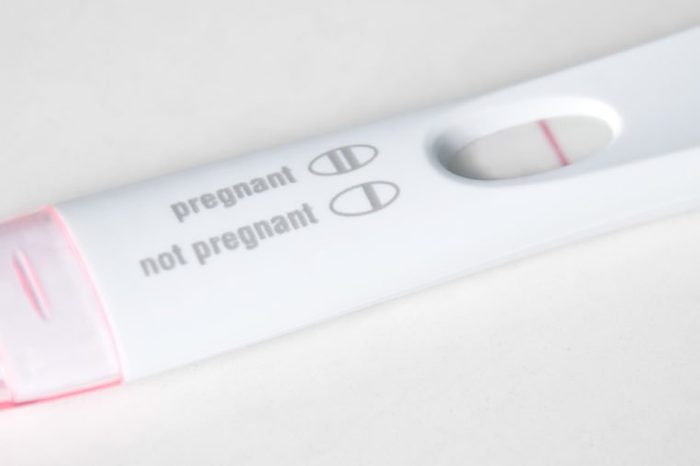
You have PCOS
About one in five women have polycystic ovary syndrome (PCOS), but unless you’ve been struggling to get pregnant you might not even know that you’re one of them. This hormonal disorder often goes hand-in-hand with infertility as well as obesity, acne, and excess body hair. If you have any of these symptoms and your periods are irregular (and you’re not approaching menopause), talk to your gynecologist about getting screened.
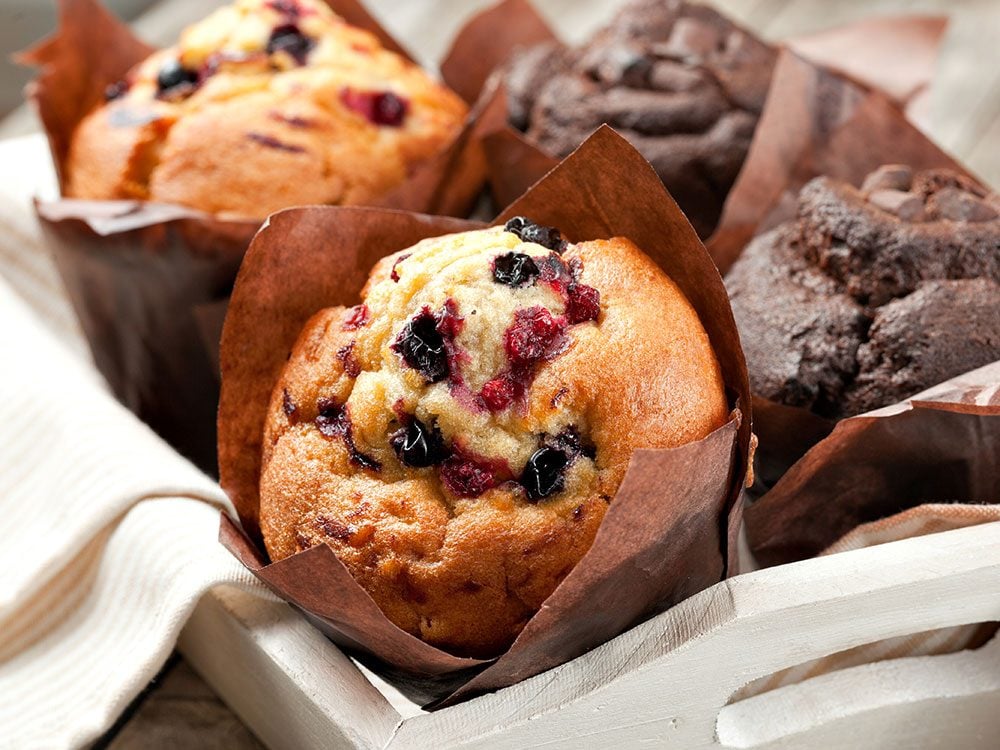
You reward exercise with a “healthy” treat
Exercising—whether you’re trying to lose weight or not—is a great move. But rewarding the effort with food is a different story, says Karen Collins, RDN. A muffin, for instance, can have around 400 calories! “It’s very easy for a reward to contain more calories than you used up during the added activity. Over time, this will lead to weight gain,” she says. “The answer is not to forego the exercise; the answer is to retrain yourself to see the walk/activity as the reward.” If that’s too difficult at first, at least opt for non-food rewards (like a pedicure or new book download).
Here are 16 ways to lose weight walking!
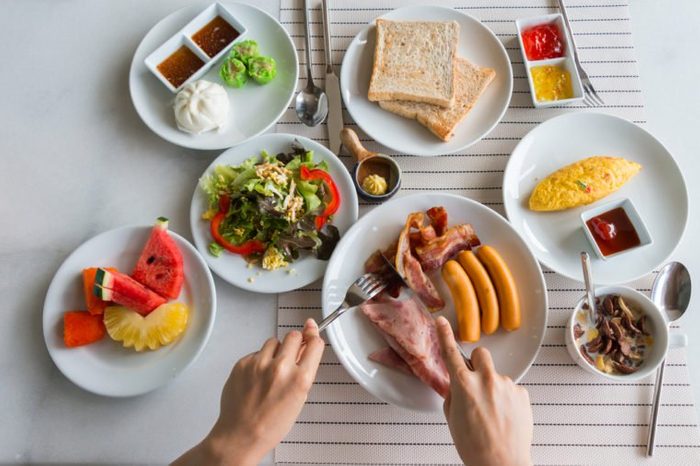
There’s too much variety in your diet
Variety may be the spice of life, but too many options might prompt you to overindulge. “Sometimes getting too much food variety can make it more challenging to curb calories,” says Jackie Newgent, RDN, private cooking coach and author of The All-Natural Diabetes Cookbook. No, you don’t have to eat the same exact thing every single day, but if you can standardize something—perhaps breakfast or your afternoon snack—it might make it easier to avoid overeating. And definitely steer clear of buffets!
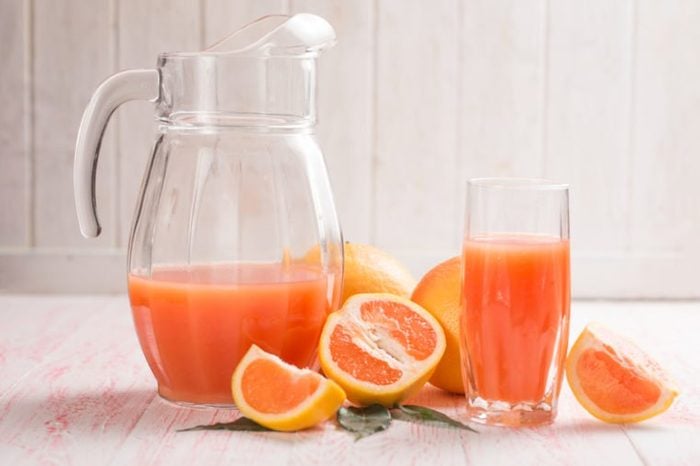
You fall for fads
Who doesn’t want a quick fix? The problem is that a short-term solution—think a lemonade/cayenne cleanse or grapefruit diet—is unlikely to yield lasting results. “You may lose 5 to 10 per cent of your body weight, but once you go off your diet you’ll gain the weight back plus more,” says Toby Smithson RDN, author of Diabetes Meal Planning and Nutrition for Dummies.
Check out the six morning habits of naturally thin people!
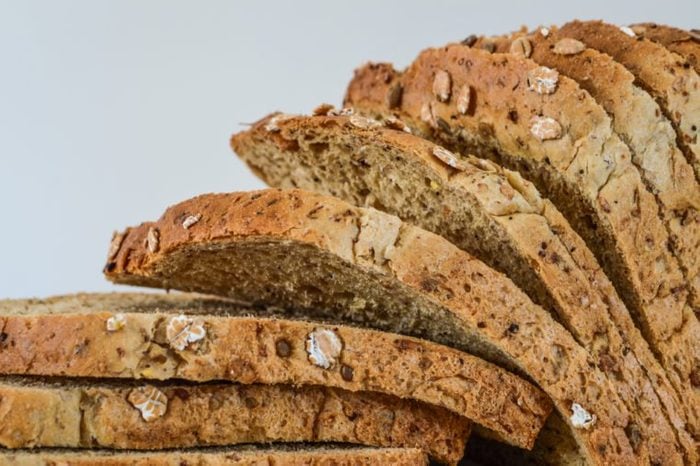
You’ve gone too low carb
Carb cutting may be trendy, and it works—to a certain extent. “If you aren’t eating carbs or are eating a diet very low in carbs, most likely you will be filling your plate with protein and fats. But the calories from too much protein or fat can also lead to weight gain,” says Smithson. Read more on why low-carb diets aren’t the answer.
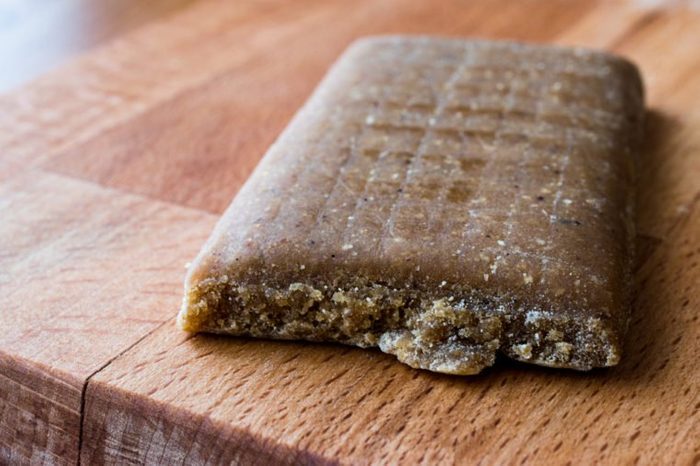
You nosh on protein bars
Unless you’re using these to replace a meal, watch out. “Most contain 200-250 calories, which is way more than is needed as a snack,” says Rachele Dependahl, RDN, CDE, a dietitian and certified diabetes educator at Cedars-Sinai in Los Angeles.
Psst—these are the nine foods you should never, ever eat before bed!
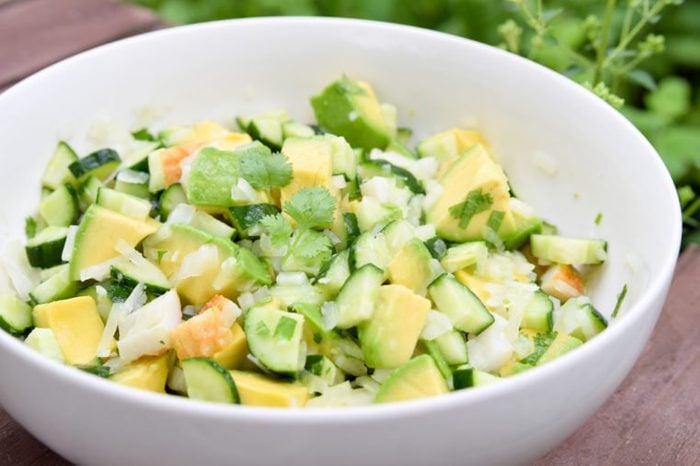
You always go for the entree salad
Don’t assume it’s the lighter option. “Salads with toppings like avocado, shredded cheese, nuts, and dressing can easily add up to more than 1,000 calories!” says Dependahl. Pay close attention to all the details and then order accordingly. Here are 15 more menu items you should avoid at a restaurant.
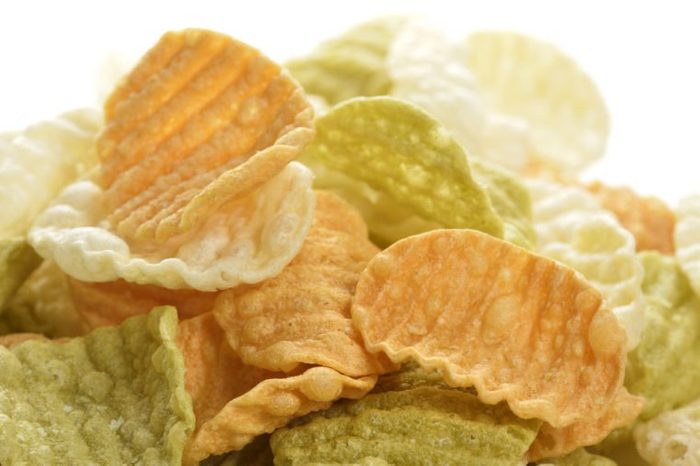
You nosh on veggie chips
Despite the misleading name, there isn’t a heck of a lot of veggies in these with the exception of processed potatoes—which means they’re not that much better for you than regular potato chips. “A small serving, like 12 veggie chips, might contain up to 160 calories,” says Dependahl. And who only eats 12? Watch out for these seven other foods you should never buy again.
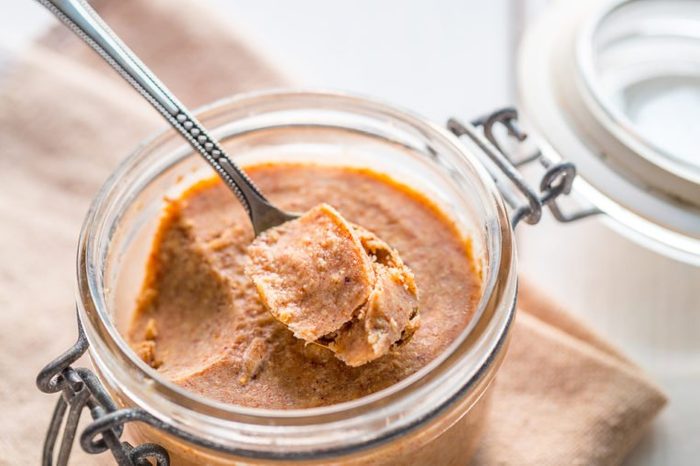
You eat almond or peanut butter by the spoonful
If you keep dipping and dipping, you’re going to gain weight. “Two tablespoons of peanut butter contain 220 calories, and when you’re dipping apple slices or celery it adds up fast,” says Dependahl.
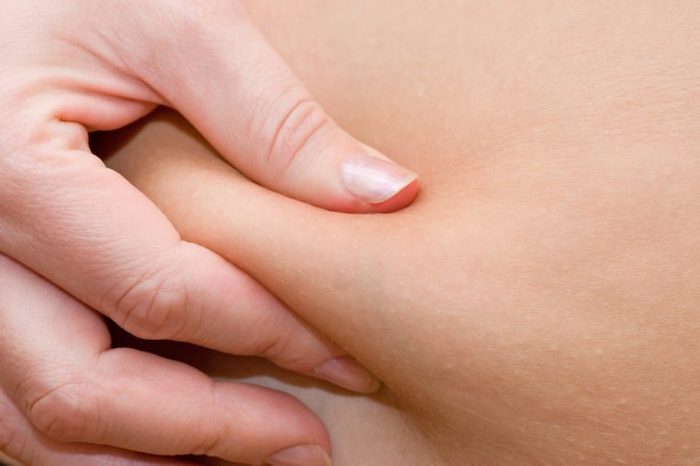
Your thyroid is out of whack
If you’ve suddenly added an extra five to ten pounds and you also have symptoms such as fatigue, dry skin, and constipation, the butterfly-shaped gland in your neck could be to blame. See your internist or an endocrinologist to get your thyroid hormone levels checked.
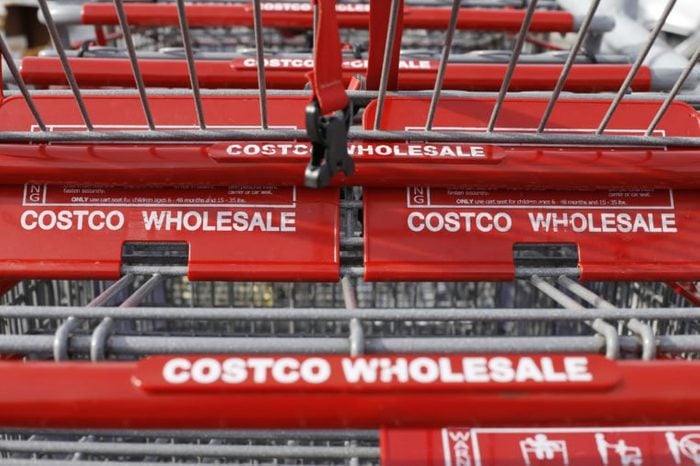
You love a good deal
If you’re a regular at Costco or Sam’s Club, we get it. But filling your cart with inexpensive food that comes in super-size packages might very well be what’s driving your recent weight gain. In fact, research has shown that the explosion of big-box stores is a contributing factor to the rising trends in obesity across the country. Instead of buying in bulk, try these six brilliant money hacks to save a bundle on groceries.
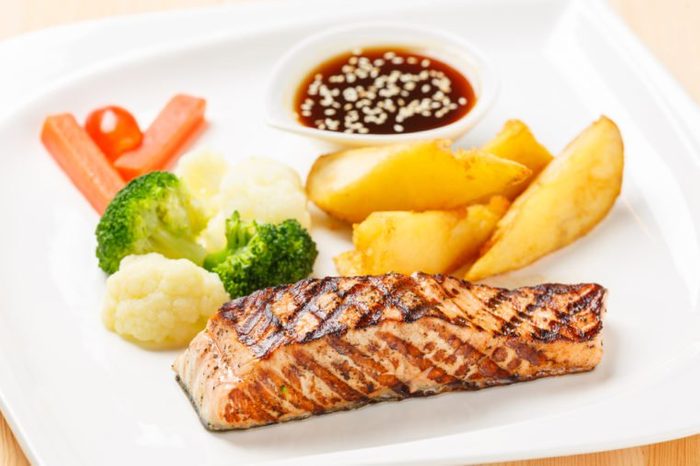
You laser in on one nutrient
“Whether it’s sugar, carbs, or fat, it’s easy to get overly focused on reducing one nutrient,” says Karen Ansel, RDN. “The truth is our bodies need a mix of carbs, protein, and fat to function properly, which is why nature included all of these in food. In my experience, eating a healthy mix of all of these is the best way to satisfy your appetite and boost your energy at the same time.”
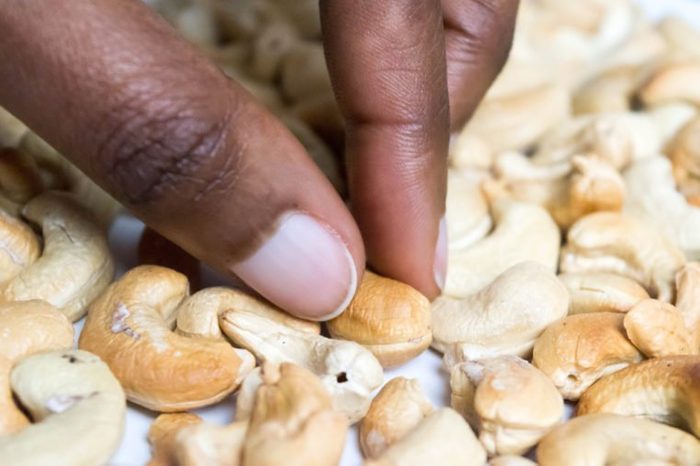
You graze all day
Think eating mini-meals will help you slim down? Not so, says Ansel. “When we’re always eating it’s really easy to put more calories in our mouths than we realize. Plus nibbling your way through the day never gives you that feeling of fullness you’d get from a real meal, so you always feel a little hungry.” Her advice: Shoot for three real meals and one small snack per day.
Check out the seven proven benefits of intermittent fasting!

Your idea of a proper portion is way off
Just because your cereal bowl fits 16 ounces doesn’t mean that’s what a single serving looks like. Oversized plates and wine glasses can cause similar confusion. “While there are lots of factors that help with weight loss, eating less overall is definitely a biggie,” says Ansel. “Think of it as simple math. If you were to shrink your portions by 10 per cent by leaving over a few bites at every meal, you’d eat 10 per cent fewer calories, which can add up to significant savings.”
Psst—you can eat large portions and still lose weight. Here’s how!

You live at sea level
There may not be much you can do about this, but research shows that people who live at higher altitudes tend to be thinner. They also have a lower incidence of type 2 diabetes. Why this is the case isn’t entirely clear, but researchers at Cedars-Sinai have suggested that atmospheric pressure, radiation levels, and other environmental issues may all factor in.
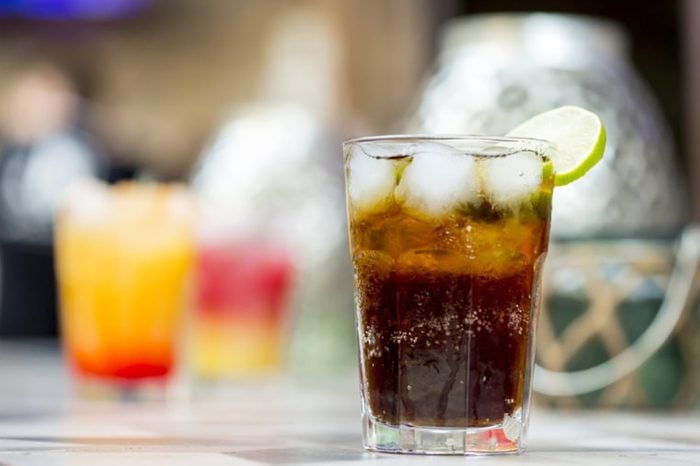
You mainline diet cola
The research here is a bit mixed—after all, it is calorie-free!—but a growing body of evidence suggests that people who regularly sip artificially-sweetened drinks are more apt to be obese and put on weight over time.
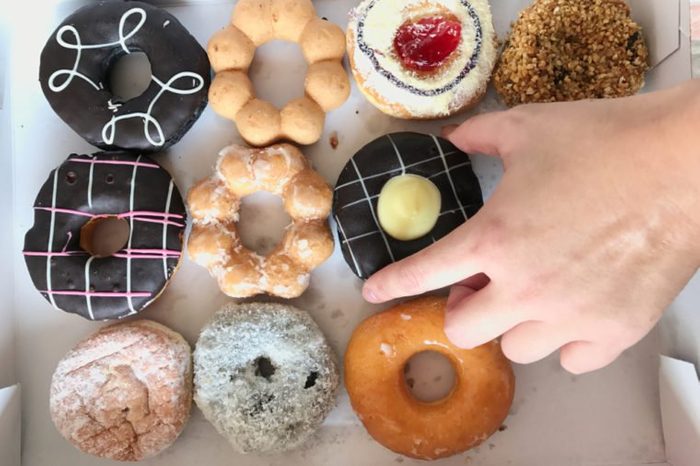
You trust too much in your willpower
If you think you can simply will yourself to pass up the donuts at your Monday meeting, you might be fooling yourself. If you want to lose weight or avoid gaining it, you need to set up your kitchen, office, and even your car for success by keeping healthy alternatives on hand. “Relying on education, willpower, and ‘mindfulness’ to be the main mechanisms to healthier eating leads people to Einstein’s definition of insanity,” says Tom Rifai, MD, founder of Elite Health Coaching and Reality Meets Science. A better bet: Look ahead, spot the pitfalls, and plan ahead so you can dodge them.
Psst—these five surprising foods have more sugar than a donut!
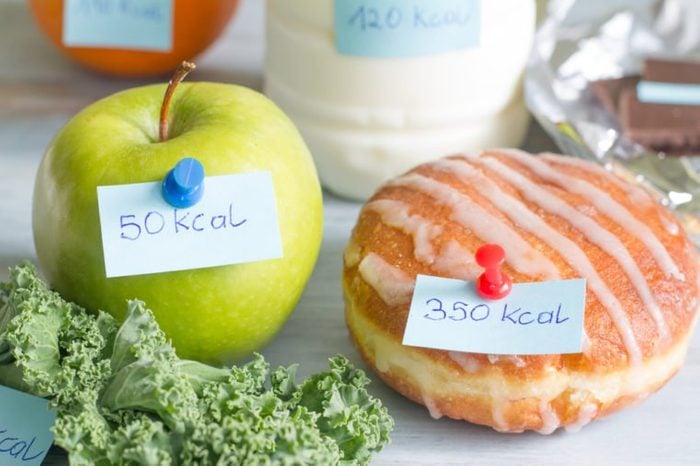
You focus on calories, but not calorie density
One tiny box of raisins has about 130 calories, which isn’t bad—but you could eat an entire cup of grapes for even less than that. “To feel comfortably full on fewer calories, you need to choose foods that are high in water and fibre,” says Dr. Rifai. Add some foods that have a lot of water and protein (like low-fat yogurt and egg whites) to your mix and you’ll be able to eat less without your tummy rumbling.
Fibre is good for us, but scientists haven’t known why—until now!
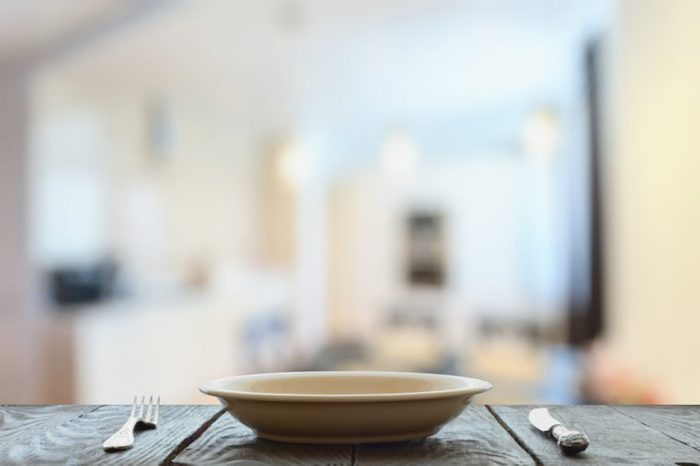
You eat too lightly during the day
“Many people believe it’s a good idea to ‘eat lightly’—basically semi-starve themselves—throughout the day, but that inevitably drives them to overeat in the evening,” says Dr. Rifai. Instead, he suggests a “don’t stuff, don’t starve” approach: Eat at the earliest signs of hunger and stop when you’re just slightly full.
Check out these 30 painless ways to increase your dietary fibre!

You only do cardio
Aerobic exercise is key for torching calories, but if you want to keep your metabolism up even while you’re at rest you absolutely have to add in some strength-training. Research has shown that people who do a combo are most likely to lose weight.
Here are the 10 things that happen to your body when you start walking 10,000 steps a day.

You take blood pressure meds or antidepressants
Antidepressants are well-known for causing weight gain, but it’s not unusual to put on a few pounds while taking a beta blocker like metoprolol to control your blood pressure, either. Whatever Rx you’re on, talk to your doctor if you think it’s making you fatter; switching to a different drug might help.
These are the four questions you must always ask before starting a new prescription.
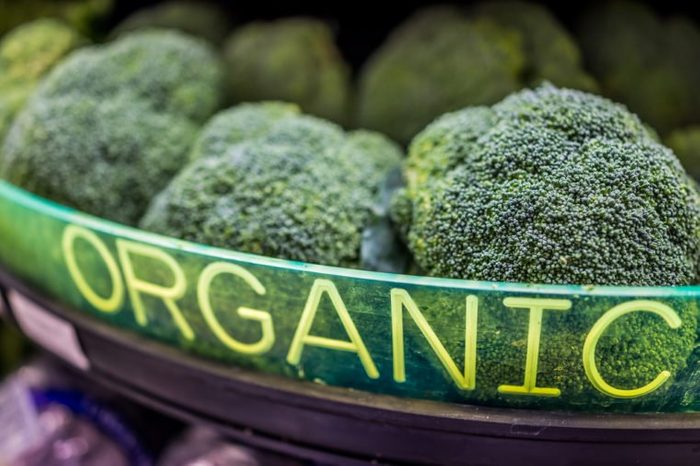
You believe “organic” equals healthy
If you want to steer clear of pesticides and support organic farming practices, that’s great. But research has shown that the word “organic” confers a health halo, even when it’s not deserved. So while you might shun regular Oreos, you have no qualms about putting those chocolate cream-filled organic cookies into your cart (and your mouth), even if the calorie content is exactly the same.
Bonus: What is jackfruit, and why is it in the new meat replacement?

Your house is a mess
Tidy house, tighter body? Research from Duke University suggests that it’s possible. Scientists discovered that the dust found in many homes is packed with hormone-disrupting chemicals that encourage your body to store more fat. Time to start Swiffering a little more often. Get a head start with these 16 genius cleaning hacks from professional house cleaners.
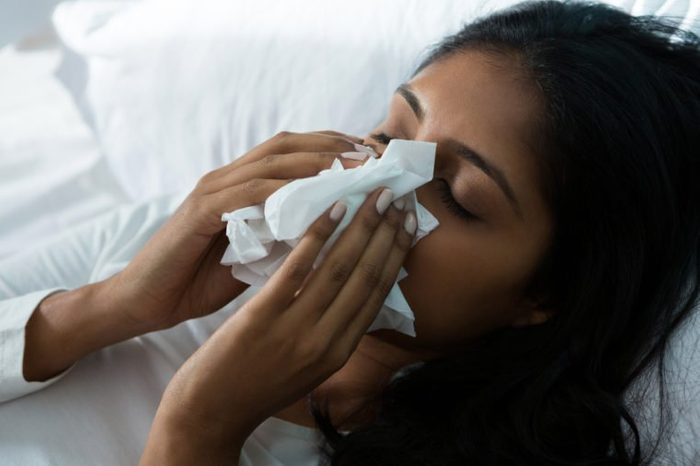
You caught this type of cold
A week or so of miserable congestion might just be the beginning of what the common cold can do to your body. A University of California-San Diego study of children found that 80 per cent of those who’d been exposed to a particular strain of the cold virus—adenovirus 36—were obese. As strange as this might sound, it doesn’t seem to be a fluke, as other research has also linked this strain with weight gain.
Under the weather? These are the 10 best meals to eat when you feel your worst!
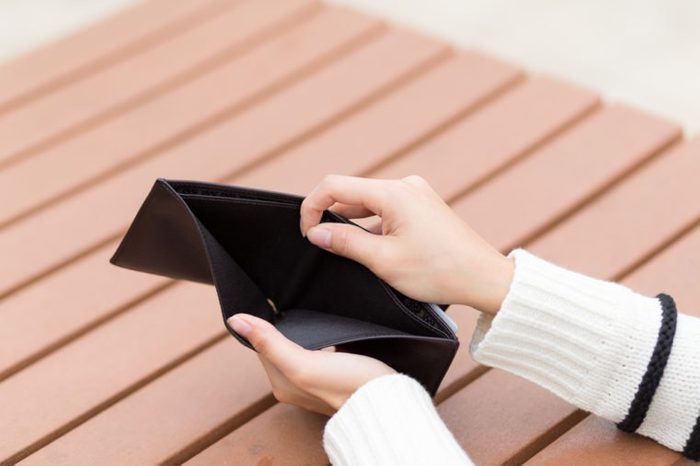
You’re broke
It’s hardly fair, but research confirms that lower-income earners are much more apt to be obese compared to those who are wealthier. While some issues related to this problem (such as a lack of fresh foods at supermarkets in poor areas) may be out of your hands, it is possible to eat well on a tight budget.
Would you recognize the signs of binge-eating disorder? Here’s what to watch for!

You’re super stressed
Turning to comfort foods is only part of the problem. Chronic stress also taxes your body and contributes to elevated levels of hormones that cause inflammation as well as lead to packing on the pounds. Unless you’re dead, some stress is a given, but finding ways to chill out can make all the difference.

You live way out in the ‘burbs
Is the nearest supermarket three miles away? Do you even have sidewalks? Research shows that suburban sprawl is closely tied to weight gain, probably because you rarely walk and rely on the car for errands and commuting. Even if you feel like you’re constantly rushing around, remember that driving carpool doesn’t translate to burning very many calories. Try wearing a fitness tracker to see how many (or few) steps you’re actually getting throughout the day.

Your nights are too bright
You may have heard that exposure to artificial light late at night messes with your sleep, but it turns out it also messes with your metabolism, according to research from Northwestern University. The good news: Installing some dimmer switches can help mitigate this problem.

You don’t get enough daylight
The flip side of too much light at night, of course, is too little (natural) light during the daytime. In fact, inadequate exposure to natural sunlight—especially during the fall and winter, when the days are shorter—seems to encourage cells to store more fat. Make an effort to see the sun for at least a few minutes each morning to help keep your body’s rhythms on track.
More of a night owl? Here are six ways to become a morning person, according to science!
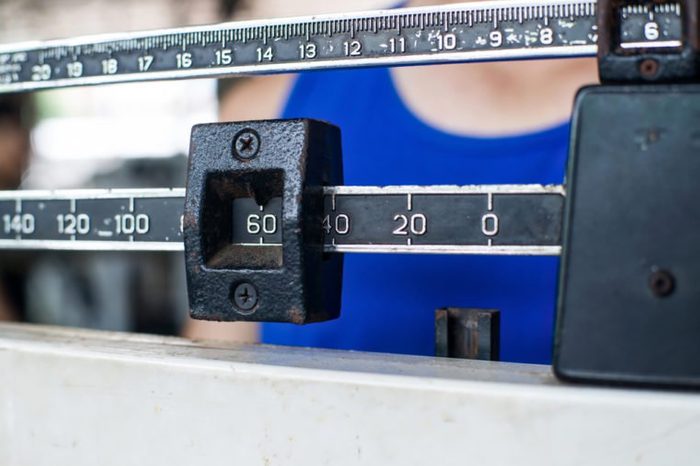
You’ve recently lost some weight, and your body wants revenge
You managed to shed a few pounds, but they’re creeping back fast because you’re hungrier than ever. What gives? Unfortunately, it’s your body’s way of trying to maintain your fat reserves for a famine that’s most likely never coming. Research shows your appetite really does surge following a loss of body weight, which means it’s all too easy for the pounds to return. Try drinking extra water and eating plenty of water-rich, low-cal foods until you no longer feel ravenous all the time.
Check out 50 ways to lose weight without a lick of exercise!